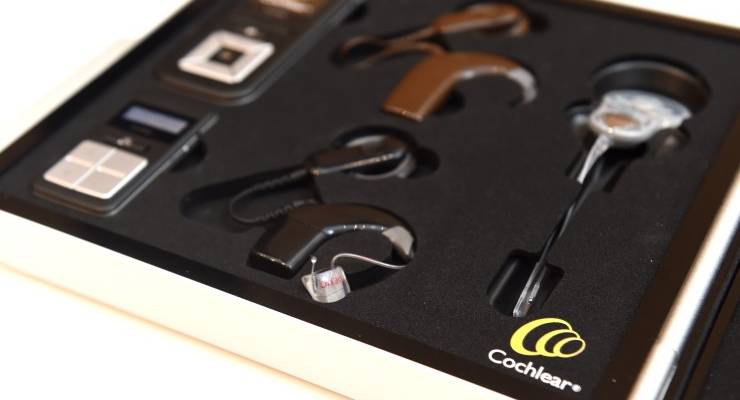
Hearing implant maker Cochlear has become the first major Australian company to look for shareholders for help in the current coronavirus crisis, looking for around $1.2 billion in new cash, a lender and dropping all dividends.
Cochlear is one of the bluest of blue chips of the Australian tech sector and a household name for its hearing implants. But its business has been crippled by the impact of coronavirus on its Chinese operations, and now sales elsewhere are under pressure from government lockdowns across the globe, notably in Europe, parts of the US and across Australia and New Zealand.
Lockdowns mean surgeries are being cancelled across the globe, so sales of its devices have stalled and are now falling.
The company believes these surgeries will recommence once the virus crisis eases and conditions start easing, but it needs cash now to continue to support the business and its highly-trained staff during the slump.
Cochlear said on Wednesday it had:
… decided to fortify its balance sheet with a significant additional liquidity injection, enabling Cochlear to both navigate current market uncertainties while continuing to invest and reinforce its position as the global leader in implantable hearing solutions.
That a company with such a stellar reputation as Cochlear has gone to market in the current crisis, means that it will soon be followed by travel companies (Flight Centre, Webjet, Helloworld, Corporate Travel), airlines (Rex, Virgin Australia, Qantas), property and real estate trusts, retailers, and media groups (Southern Cross, oOh!media).
With Wall Street rebounding strongly on Tuesday and a similar surge here today, Cochlear and its advisers have thought now is the time to be the first Australian company to put a figure on how much it needs to survive.
That figure is $800 million from major institutional shareholders, a further $50 million from small shareholders in a retail offer, an extra $150 million from an unnamed “lender”, and the dropping of dividends after the current interim is paid next month.
Suspending dividends will save Cochlear up to $190 million a year, which will be cash retained in the company to maintain employment and production of its hearing devices.
All up the company needs around $1.2 billion to help ride out the slump. The size of the fundraising is a bit of an eye opener, especially when the company’s current market cap is only $9.7 billion (which is down by a quarter since the start of the year). The shares were suspended on Wednesday to allow the major part of the fundraising to happen.
Media and travel companies already on the hunt for new capital might have to wait if Cochlear is followed quickly by other groups looking for money.
Cochlear being first cab off the rank is a surprise — a week ago it was battening down the hatches and withdrawing earnings guidance, with no sign of any move to raise new capital. Today it says it is taking “preemptive and decisive action to ensure it remains strongly capitalised during the current market uncertainties and to position the company for the future”.
The news recalls the move by dozens of companies to raise cash in the GFC.
By the end of that slump, Australian shareholders — mostly super funds — had invested more than $160 billion in new or secondary market fundraisings by all companies, including the big banks from 2008 to 2010.
Some $90 billion was raised in 2008-09 alone. Losses from company failures in the same year were put at $66 billion by ASIC.
In stark contrast to Cochlear’s fund raising, Qantas has gone down the higher debt route. It told the ASX on Wednesday it had borrowed $1.05 billion in new debt to help see it through the COVID-19 crisis.
The 10-year loan, at a 2.75% interest rate (home loan rates, really), was secured against a number of planes in its fleet which the airline bought outright for cash in recent years. The new debt increases Qantas’ available cash balance to $2.95 billion, and it has another $1 billion undrawn debt facility available.
Net debt rises to massive $5.1 billion, which is at the low end of its target range. Qantas has no major maturities until June 2021, but it does have around $8 billion in payables due over the next year, some of which won’t need to be made (fuel, landing charges etc).








Crikey is committed to hosting lively discussions. Help us keep the conversation useful, interesting and welcoming. We aim to publish comments quickly in the interest of promoting robust conversation, but we’re a small team and we deploy filters to protect against legal risk. Occasionally your comment may be held up while we review, but we’re working as fast as we can to keep the conversation rolling.
The Crikey comment section is members-only content. Please subscribe to leave a comment.
The Crikey comment section is members-only content. Please login to leave a comment.